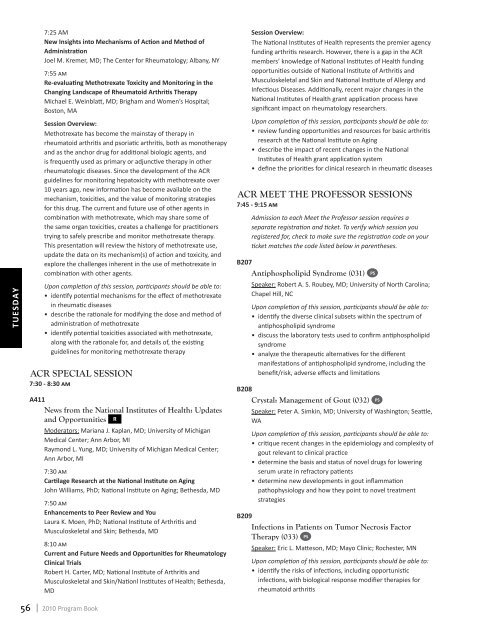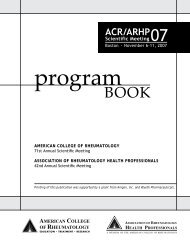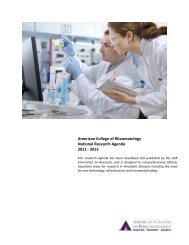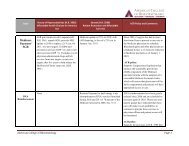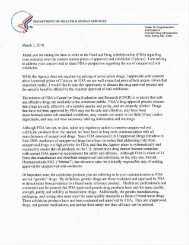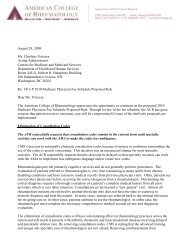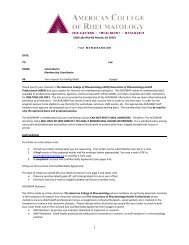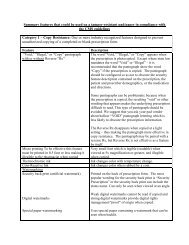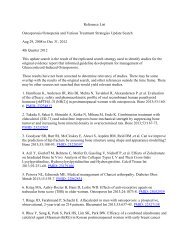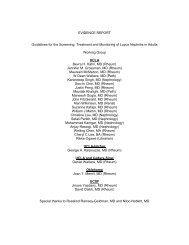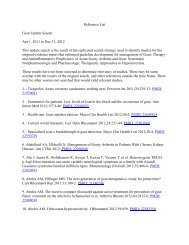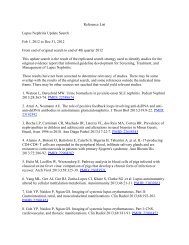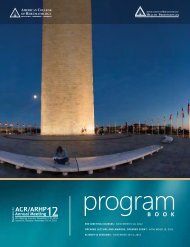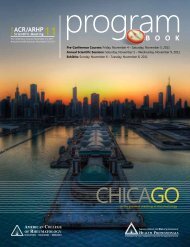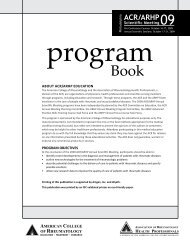B O O K - American College of Rheumatology
B O O K - American College of Rheumatology
B O O K - American College of Rheumatology
Create successful ePaper yourself
Turn your PDF publications into a flip-book with our unique Google optimized e-Paper software.
tuesday<br />
7:25 AM<br />
New Insights into Mechanisms <strong>of</strong> Action and Method <strong>of</strong><br />
Administration<br />
Joel M. Kremer, MD; The Center for <strong>Rheumatology</strong>; Albany, NY<br />
7:55 am<br />
Re-evaluating Methotrexate Toxicity and Monitoring in the<br />
Changing Landscape <strong>of</strong> Rheumatoid Arthritis Therapy<br />
Michael E. Weinblatt, MD; Brigham and Women’s Hospital;<br />
Boston, MA<br />
Session Overview:<br />
Methotrexate has become the mainstay <strong>of</strong> therapy in<br />
rheumatoid arthritis and psoriatic arthritis, both as monotherapy<br />
and as the anchor drug for additional biologic agents, and<br />
is frequently used as primary or adjunctive therapy in other<br />
rheumatologic diseases. Since the development <strong>of</strong> the ACR<br />
guidelines for monitoring hepatoxicity with methotrexate over<br />
10 years ago, new information has become available on the<br />
mechanism, toxicities, and the value <strong>of</strong> monitoring strategies<br />
for this drug. The current and future use <strong>of</strong> other agents in<br />
combination with methotrexate, which may share some <strong>of</strong><br />
the same organ toxicities, creates a challenge for practitioners<br />
trying to safely prescribe and monitor methotrexate therapy.<br />
This presentation will review the history <strong>of</strong> methotrexate use,<br />
update the data on its mechanism(s) <strong>of</strong> action and toxicity, and<br />
explore the challenges inherent in the use <strong>of</strong> methotrexate in<br />
combination with other agents.<br />
Upon completion <strong>of</strong> this session, participants should be able to:<br />
• identify potential mechanisms for the effect <strong>of</strong> methotrexate<br />
in rheumatic diseases<br />
• describe the rationale for modifying the dose and method <strong>of</strong><br />
administration <strong>of</strong> methotrexate<br />
• identify potential toxicities associated with methotrexate,<br />
along with the rationale for, and details <strong>of</strong>, the existing<br />
guidelines for monitoring methotrexate therapy<br />
ACR Special Session<br />
7:30 - 8:30 am<br />
A411<br />
News from the National Institutes <strong>of</strong> Health: Updates<br />
and Opportunities R<br />
Moderators: Mariana J. Kaplan, MD; University <strong>of</strong> Michigan<br />
Medical Center; Ann Arbor, MI<br />
Raymond L. Yung, MD; University <strong>of</strong> Michigan Medical Center;<br />
Ann Arbor, MI<br />
7:30 am<br />
Cartilage Research at the National Institute on Aging<br />
John Williams, PhD; National Institute on Aging; Bethesda, MD<br />
7:50 am<br />
Enhancements to Peer Review and You<br />
Laura K. Moen, PhD; National Institute <strong>of</strong> Arthritis and<br />
Musculoskeletal and Skin; Bethesda, MD<br />
8:10 am<br />
Current and Future Needs and Opportunities for <strong>Rheumatology</strong><br />
Clinical Trials<br />
Robert H. Carter, MD; National Institute <strong>of</strong> Arthritis and<br />
Musculoskeletal and Skin/Nationl Institutes <strong>of</strong> Health; Bethesda,<br />
MD<br />
Session Overview:<br />
The National Institutes <strong>of</strong> Health represents the premier agency<br />
funding arthritis research. However, there is a gap in the ACR<br />
members’ knowledge <strong>of</strong> National Institutes <strong>of</strong> Health funding<br />
opportunities outside <strong>of</strong> National Institute <strong>of</strong> Arthritis and<br />
Musculoskeletal and Skin and National Institute <strong>of</strong> Allergy and<br />
Infectious Diseases. Additionally, recent major changes in the<br />
National Institutes <strong>of</strong> Health grant application process have<br />
significant impact on rheumatology researchers.<br />
Upon completion <strong>of</strong> this session, participants should be able to:<br />
• review funding opportunities and resources for basic arthritis<br />
research at the National Institute on Aging<br />
• describe the impact <strong>of</strong> recent changes in the National<br />
Institutes <strong>of</strong> Health grant application system<br />
• define the priorities for clinical research in rheumatic diseases<br />
ACR Meet the Pr<strong>of</strong>essor Sessions<br />
7:45 - 9:15 am<br />
Admission to each Meet the Pr<strong>of</strong>essor session requires a<br />
separate registration and ticket. To verify which session you<br />
registered for, check to make sure the registration code on your<br />
ticket matches the code listed below in parentheses.<br />
B207<br />
Antiphospholipid Syndrome (031) PS<br />
Speaker: Robert A. S. Roubey, MD; University <strong>of</strong> North Carolina;<br />
Chapel Hill, NC<br />
Upon completion <strong>of</strong> this session, participants should be able to:<br />
• identify the diverse clinical subsets within the spectrum <strong>of</strong><br />
antiphospholipid syndrome<br />
• discuss the laboratory tests used to confirm antiphospholipid<br />
syndrome<br />
• analyze the therapeutic alternatives for the different<br />
manifestations <strong>of</strong> antiphospholipid syndrome, including the<br />
benefit/risk, adverse effects and limitations<br />
B208<br />
Crystal: Management <strong>of</strong> Gout (032) PS<br />
Speaker: Peter A. Simkin, MD; University <strong>of</strong> Washington; Seattle,<br />
WA<br />
Upon completion <strong>of</strong> this session, participants should be able to:<br />
• critique recent changes in the epidemiology and complexity <strong>of</strong><br />
gout relevant to clinical practice<br />
• determine the basis and status <strong>of</strong> novel drugs for lowering<br />
serum urate in refractory patients<br />
• determine new developments in gout inflammation<br />
pathophysiology and how they point to novel treatment<br />
strategies<br />
B209<br />
Infections in Patients on Tumor Necrosis Factor<br />
Therapy (033) PS<br />
Speaker: Eric L. Matteson, MD; Mayo Clinic; Rochester, MN<br />
Upon completion <strong>of</strong> this session, participants should be able to:<br />
• identify the risks <strong>of</strong> infections, including opportunistic<br />
infections, with biological response modifier therapies for<br />
rheumatoid arthritis<br />
56<br />
2010 Program Book


